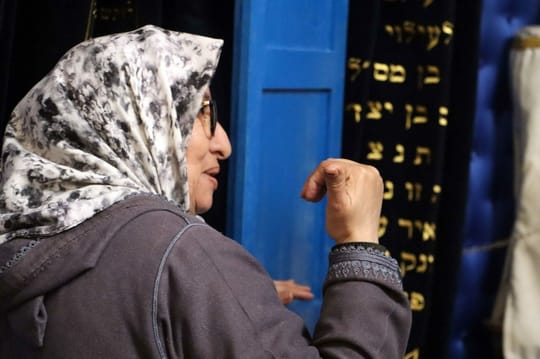Malika and Mohssine: Muslim-Jewish Memory Guardians in Essaouira

The keys to one of Morocco’s most renowned Jewish sacred sites is held by a Muslim family, and it has been for years. Just a few meters from the former Talmud Torah school in Essaouira is a centuries-old synagogue brimming with history that was named after Morocco’s most prominent Rabbinic leader of the 18th century.
Today’s story of interfaith Morocco will take us to Synagogue Rabbi Haim Pinto. The site, which comprises both the synagogue and the Pinto family house, attracts over 2000 pilgrims from all over the world, annually, to commemorate the “Hiloula,” the anniversary of the death of Rabbi Haim Pinto.
Malika and her son, Mohssine, have been entrusted with the safeguarding of three Jewish sites in Essaouira for over two decades. While she looks after the Haim Pinto Synagogue, her son ensures the maintenance of the city’s two Jewish cemeteries—a task he inherited from his maternal grandfather. Mohssine is 38 years old now, but he was only 16 when he became the guardian of the city’s Jewish cemeteries. According to him, the Haim Pinto Mausoleum is a must-stop for pilgrims from all over the world during the Hiloula to pay homage to the most venerated Rabbi Haim Pinto. The last person buried here passed away in 2020. He had previously declared his will to be buried in Essaouira’s old Jewish cemetery though the new Jewish cemetery was opened in 1892 on the opposite side of the street.
With utmost sincerity and dedication, Malika ensures that whoever enters the synagogue travels back in time as she reveals the history of the place in its smallest details. One of the stories she still remembers vividly is that of a Muslim woman with six children who came from the suburbs of Essaouira. Her children had been late to register for school, and her Jewish neighbor who tutored her son after classes offered to tutor all six children without any compensation. “We didn’t have labels such as ‘my muslim neighbor’ or ‘my Christian neighbor.’ We were simply neighbors. It was really sad when they had to leave. I remember that everybody was crying when we parted ways.”
“Growing up with people from different cultures and faiths, we treated each other as neighbors and friends. We helped each other. Living in harmony was a natural act. We just simply respected each other.”
Malika’s memories of her Jewish neighbors add up to the beauty of the site, and just as the many other Muslim guardians, her devotion to the safeguarding of these places of memory is a result of years-old Jewish-Muslim relationships that were built on trust and mutual respect.
—
This article is part of a series of interviews that celebrates Interfaith Harmony Week (February 1-7, 2023) and have been facilitated by the USAID Dakira program, which is implemented by the High Atlas Foundation and its partners and aims to strengthen inter-religious and inter-ethnic solidarity through community efforts that preserve cultural heritage in Morocco.
The article was completed with the support of the United States Agency for International Development (USAID), and the High Atlas Foundation is solely responsible for its content, which does not necessarily reflect the views of USAID or the Government of the United States.